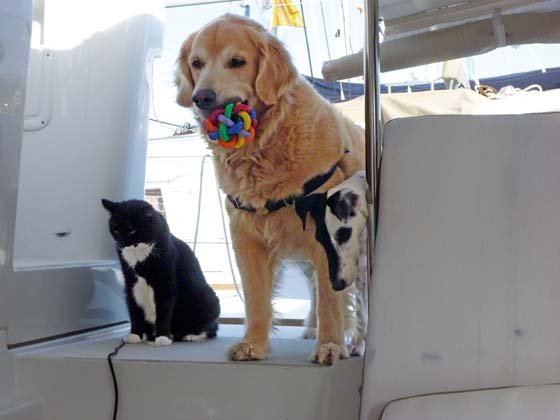Sailing with pets longterm

Cruising with your pet companion is possible. Some cats and dogs don't really care about where they are, as long as their humans are close by. But how does a canine or feline becomes a sea loving creature? Well, they either love it or hate it.
The challenges
Movement of the boat can be unpleasant at times, even for humans. This is no different for your pet. Both dogs and cats like having a nice place on deck, or near a window with the view of the sea. If they're on deck while the sailboat's underway, your pets should be secured with a safety harness. Basically, you don't want them moving around the deck very much.
Carolyn Shearlock says this on her blog about safety onboard:
“Don’t rely on lifeline netting to keep the dog aboard — they can find ways to get under or over it, as well as the places where it’s impossible to have it.”
Toilet training is a must! With dogs, the most common practise we've seen is a piece of synthetic grass matt placed on deck - you just have to teach them it is the right place to do their business. Cats can use litter boxes, or in some cases, regular toilets.
Unfortunately, there are some destinations which are very difficult to get to with pets. Jamaica, Australia, New Zealand and South Pacific are just some of locations that you should probably avoid if there are pets onboard. Getting the paperwork approved is very difficult, in some cases even impossible. Although regulations change frequently, we do not expect a major change towards simplifying the laws in the near future.
Silke Sommerfield shared her experience of cruising with both a dog and a cat in an article for Yachting World. She had this to say about the bureaucracy involved in having pets onboard:
“Every country has different rules. In Europe it’s easier because there is a European pet passport, but there’s a lot of additional work with the papers and expense with the vaccines, antibiotics and vets’ inspections.”
The paperwork
Apart from pet passport, there are other documents you need to sail with your pet. Quarantines may apply if you're entering a new country and you should always check the vaccine shots and paperwork necessary for the countries you plan to visit.
Quarantine has to be approved by a veterinarian, but this usually means your pet will spend this time at home (in this case - your vessel) and cannot come in contact with other animals for several weeks. Apart from shots and quarantine, there will be some blood samples taken and a regular health check-up.
The joy!
Any pet parent would like to take their animal friend everywhere with them, right? We can see the joy it brings to sailors who share their adventures on YouTube. It's also great to watch how some pets get accustomed to heir salty home.
Follow The Boat have a Q&A video all about their experience as cat owners and sailors. We love their cat Millie, who is a fierce swimmer, observer and uses regular toilet as a well mannered cat that she is.
And if you're wondering how would two slightly larger dogs do on a sailboat, check out Sailing Doodles and their YouTube channel:
Wicked Salty's Wes and Kate are cruising again, so we can look forward to more videos featuring their Yorkshire terrier Lola. Check out their video from 2016 to see how they did it the last time:
And if you still want more, look at SV Seawolf Sailing on YouTube. Although they haven't been uploading since they had a baby in 2016, their old videos are still available to watch. And you can find updates on their Facebook page. We're sure you will love their “Security Officer” Bear Bear, a cute dog that has mastered the art of getting off the boat, but otherwise is a great companion.

For videos about life with two cats on a catamaran, check out Gone with the Wynns, and read our article about them.
There are many sailors who figured out a way to keep a pet while sailing. Whether you're considering moving onboard with the pet you already own, or think about getting one, the outcome always depends on you and how they get accustomed to their new lifestyle. Most pets love being on the move, exploring new places and meeting new people. They are a big responsibility, but if you are determined to keep them onboard, they will reward you with endless love and cuddles for days.
krakenlife.com
Previous summer we sailed with a rabbit. I'm quite sure it doesn't work out that way, but my wife optimistically defined our ship as Norwegian territority, hence as long as the rabbit stayed on the ship we shouldn't need worrying about rules on taking pets across the borders. In any case, we've so far never been stopped by any custom controls.
It all depends on the countries that you sail to, sometimes there is no need for quarantine, shots and such. The paperwork also doesn't have to be extensive, it all depends. Just to be safe though, a visit to the vet's office isn't a bad idea. There are diseases dangerous to animals and not humans, local epidemics, air-borne diseases... Many things can happen which one cannot prepare for, but as they say "better safe than sorry", so it's good to keep yourself informed. Even if the pet doesn't leave the boat, they can still get ill or bring an illness with them to a new environment. Well, I hope you won't run into any trouble. A rabbit actually sounds like an excellent companion to have on a boat. Safe sailing to you!
➜@bible.com
meep